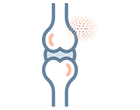Osteogenesis Imperfecta
Osteogenesis Imperfecta (OI) is a disorder of bone fragility caused generally by mutations in the COL1A1 and COL1A2 genes that encode type I collagen.


Osteogenesis Imperfecta (OI) is a disorder of bone fragility caused generally by mutations in the COL1A1 and COL1A2 genes that encode type I collagen. OI is one of the most common skeletal dysplasias. It is a generalized disease that is phenotypically and molecularly heterogeneous manifesting with a broad array of signs and symptoms including connective tissue and systemic manifestations in addition to bone fragility.
The more prevalent autosomal dominant forms of osteogenesis imperfecta are caused by primary defects in type 1 collagen, whereas autosomal recessive forms are caused by deficiency of proteins which interact with type 1 procollagen. There are at least 8 different types of the disease based on the inheritance. The differential diagnosis of OI includes child abuse, rickets, osteomalacia and other rare skeletal syndromes.
The Igenomix Osteogenesis Imperfecta Precision Panel can be used to make a directed and accurate differential diagnosis of bone fragility ultimately leading to a better management and prognosis of the disease. It provides a comprehensive analysis of the genes involved in this disease using next-generation sequencing (NGS) to fully understand the spectrum of relevant genes involved.
The Igenomix Osteogenesis Imperfecta Precision Panel is indicated for those patients with a suspected clinical diagnosis of osteogenesis imperfecta presenting with the following manifestations:
The clinical utility of this panel is:
Pauli, R. (2019). Achondroplasia: a comprehensive clinical review. Orphanet Journal Of Rare Diseases, 14(1). doi: 10.1186/s13023-018-0972-6
Horton, W., Hall, J., & Hecht, J. (2007). Achondroplasia. The Lancet, 370(9582), 162-172. doi: 10.1016/s0140-6736(07)61090-3
Baitner, A., Maurer, S., Gruen, M., & Di Cesare, P. (2000). The Genetic Basis of the Osteochondrodysplasias. Journal Of Pediatric Orthopaedics, 594-605. doi: 10.1097/00004694-200009000-00010
Ornitz, D. M., & Legeai-Mallet, L. (2017). Achondroplasia: Development, pathogenesis, and therapy. Developmental dynamics : an official publication of the American Association of Anatomists, 246(4), 291–309. https://doi.org/10.1002/dvdy.24479
Daugherty A. (2017). Achondroplasia: Etiology, Clinical Presentation, and Management. Neonatal network : NN, 36(6), 337–342. https://doi.org/10.1891/0730-0832.36.6.337
Horton, W., Hall, J., & Hecht, J. (2007). Achondroplasia. The Lancet, 370(9582), 162-172. doi: 10.1016/s0140-6736(07)61090-3
Legare JM. Achondroplasia. 1998 Oct 12 [Updated 2020 Aug 6]. In: Adam MP, Ardinger HH, Pagon RA, et al., editors. GeneReviews® [Internet]. Seattle (WA): University of Washington, Seattle; 1993-2021. Available from: https://www.ncbi.nlm.nih.gov/books/NBK1152/